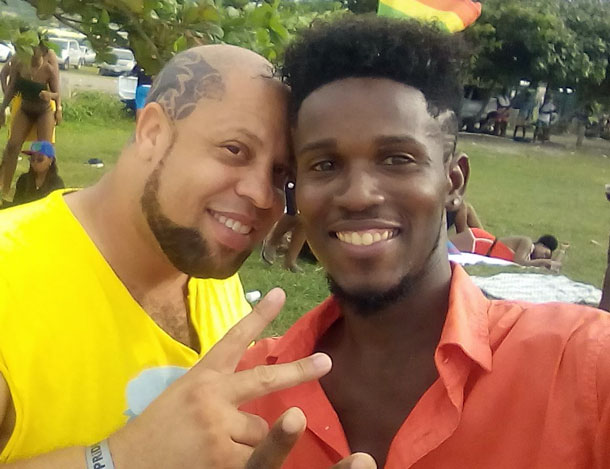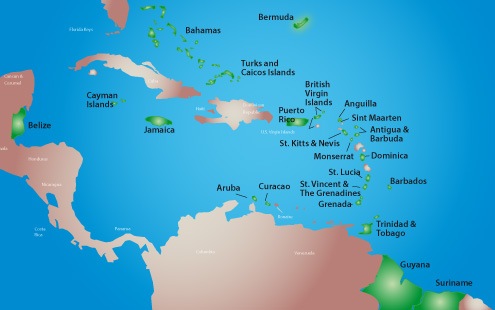Jamaica: homophobia’s last stand
After back-to-back victories in court challenges to buggery laws in Antigua and Barbuda and St. Kitts and Nevis, Trinidad-based international journalist Mark Wilson wonders why it is that attitudes toward queer people seem to be changing for the better across the Caribbean, except in Jamaica.
CLICK for a free subscription to Erasing 76 Crimes

Mark Wilson, an international journalist based in Port of Spain, Trinidad, published this commentary in the Trinidad Express on Oct. 13:
Change is in the air. Everywhere, that is, except Jamaica
On July 5, the courts overturned Antigua’s buggery law, which threatened 15 years in the island’s overcrowded prison. On August 29, they toppled the buggery law in St. Kitts and Nevis.
Both rulings came from the Eastern Caribbean Supreme Court, which also covers St. Lucia, Grenada, St. Vincent and Dominica.
In Dominica, the court heard a challenge to the Sexual Offences Act [on Sept 28, 2022]. Will it rule the same way? That seems likely. Challenges are also reported in St. Lucia, St. Vincent and Grenada.
Two cases are before the courts in Barbados. One has been heard, with a judgment expected within weeks.

Trinidad and Tobago’s homophobic legislation was overturned by the high court in 2018. A similar ruling in Belize came two years earlier, in 2016—and was later upheld by their appeal court.
The Bahamas repealed its homophobic laws in 1991. Under pressure from London, the five remaining British overseas territories decriminalised at the start of 2001.
That leaves just two countries with no immediate prospect of decriminalisation, Guyana and Jamaica. They would be a lonely couple, the only places in the Americas, North and South, where gay love can land you behind bars.
Attitudes are evolving in Guyana. An opinion poll this summer showed a clear majority for decriminalising.
Polls elsewhere tell a similar story. A 2019 survey in Barbados found just under half of respondents wanting to retain the buggery laws. That is a big drop from 87 per cent in 2004.
But the real stand-out is Jamaica. In August, the Jamaica Gleaner published a poll showing only 12 per cent wanting gay sex decriminalised. That percentage was remarkably constant across males and females, old and young. Among the upper-income groups, a slightly higher figure of 19 per cent favoured decriminalisation. To its credit, the Gleaner has bravely taken an editorial stance against the buggery laws.
Outside the Bahamas, politicians seem reluctant to make waves by dumping laws. They are happy to leave the job to the courts.
Antigua’s information minister says his government will not be “actively re-framing” the homophobic law. He says: “If a person feels that they’re being discriminated against… the court is the perfect place for that determination.”
The deadline has now passed for an appeal against Antigua’s July court judgment.
Some churches are furious. But Antigua’s prime minister, Gaston Browne, says firmly: “Many of them are hypocrites. Some of them are involved in the very act… We can’t build a society based on discrimination.”
In Belize, the government accepted the 2019 local appeal court ruling. They did not run to the CCJ. But the legal route can be slow and bumpy.
Maurice Tomlinson is a former law lecturer from Jamaica who fled to Canada in 2012. He had received multiple death threats when the Jamaica Observer front-paged his marriage to a Canadian same-sex partner.
In 2015, Tomlinson launched a challenge to his country’s buggery laws. There is a ten-year sentence for buggery, and two years for “gross indecency,” such as kissing another man.
The law was tightened ten years ago to require former offenders to carry a pass at all times. Failing to comply with that add-on brings a further one-year prison sentence, or a fine of one million Jamaica dollars. Jamaica’s 2011 “Charter of Fundamental Rights” has a carefully targeted savings clause, which attempts to prevent any challenge to pre-existing sexual offences and abortion laws.
However, Jamaica’s gay “pass law” came after the Charter, not before.
Tomlinson’s case is mired in a procedural swamp. Nine church groups were accepted as interested parties. They each have the right to call innumerable “expert” witnesses and cross-examine everyone at length on every point.
The government applied in 2016 to split the case into two—one dealing with the savings law issues, and the other with human rights. It took until January this year for the court to block that move. The government has appealed. Whoever loses that procedural appeal will go to the Privy Council—and that still leaves the substantive case stuck to the starting blocks. We’ll be lucky to see a final Privy Council ruling before 2030.
And the Privy Council? Jamaica wants to cut the London link, but seems distrustful of the CCJ, which in 2018 struck down Guyana’s colonial-era laws against cross-dressing. Delroy Chuck, Jamaica’s justice minister, said [in August]: “When we leave the Privy Council, we should have a Jamaica final court.”
Opinion in Guyana may be shifting, but the politicians are not. In 2003, Guyana shelved a proposed constitutional amendment to outlaw discrimination against gay men and lesbians. It had been vetoed earlier by the then-president Bharrat Jagdeo, now again in office as a powerful vice-president.
Instrumental in blocking the amendment was Juan Edghill, founder and presiding bishop of the Zadok Ministers’ Fellowship. He chaired Guyana’s Ethnic Relations Commission from 2003 to 2011, and is now Minister of Public Works.
Changing the law, of course, is at best half the battle. Bullying and discrimination continue—and worse. In Jamaica, [a young trans woman and her partner] were shot dead execution-style on Emancipation Day, August 1. As they say, “investigations are continuing.”




